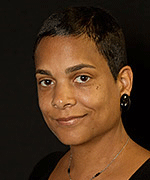Q&A series with ECS OpenCon 2017 speakers

Dina Paltoo, director, Division of Scientific Data Sharing Policy, Office of Science Policy,
National Institutes of Health
ECS will be hosting its first ever OpenCon event on October 1 in National Harbor, MD. OpenCon will be ECS’s first, large community event aimed at creating a culture of change in how research is designed, shared, discussed, and disseminated, with the ultimate goal of making scientific progress faster.
During ECS’s OpenCon, Dina Paltoo, director of the Division of Scientific Data Sharing Policy at the National Institutes of Health’s Office of Science Policy, will give a talk on open and government.
The following conversation is part of a series with speakers from the upcoming ECS OpenCon. Read the rest of the series.
ECS: Why are you interested in OpenCon?
Dina Paltoo: OpenCon will bring together various stakeholders to learn about recent updates and current activities in open science and public access. Science is generating a vast amount of data, and these data are becoming increasingly digital. The digitization of these data, along with advances in bioinformatics and information technology, as well changes to scientific ethos and practices, are allowing for increased access to and analyses of data. Thus, these data may be used to answer additional research questions which can advance science and benefit the public. It is important for the scientific community to understand the benefits of open science and public access to data.
ECS: The bio and life sciences, as well as the math and physics community, have been early adopters of tools in the open science paradigm. Do you think there are easily transferrable lessons for other scientific disciplines?
DP: I would agree that some scientific communities have been ahead of others, with regards to the open science paradigm. Within the biological sciences for example, the genomics community has been openly sharing data for a number of years. A culture change is needed in many scientific disciplines, and the math and physics community could definitely provide case studies and lessons learned which other disciplines can adopt.
ECS: What are the biggest challenges of openness in your field of study or at NIH?
DP: Some of the biggest challenges of openness are related to a culture change, resources, and implementation of the FAIR (Finable, Accessible, Interoperable, and Resuable) Principles for data. As mentioned in #2, many scientific disciplines are not used to sharing data. Thus we need to consider incentives for data sharing. Such incentives may revolve around finding datasets, citation of datasets, and providing attribution to those who have generated the data and made it accessible. Sustainability and long-term preservation needs of data and repositories must also be considered when addressing openness and making data available to others.
ECS: How will the open mandates from the Holdren memo be enforced? Will each funding agency be charged with monitoring the openness of their funded research?
DP: Each funding agency under the Holdren memo is enforcing the memo’s open mandates. Most of the agencies have completed their Public Access Plans, and many of them have developed new policies to implement those Plans. Though there may be similarities amongst the agencies, each agency is charged with monitoring compliance with its agency plans and policies.
ECS: You are working on an inter-agency coalition on open data. Can you talk about the goals of this group and accomplishments so far?
DP: The Interagency Working Group on Open Science (a Working Group of the Committee on Science of the White House National Science and Technology Council) is a trans-agency group that was formed to exchange information and coordinate efforts with regards to public access and open science policies and practices. The Working Group is identifying additional objectives and recommendations for federal open science activities, which will be made publicly available in the future.


